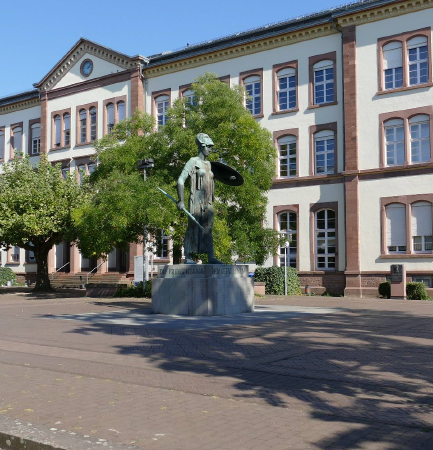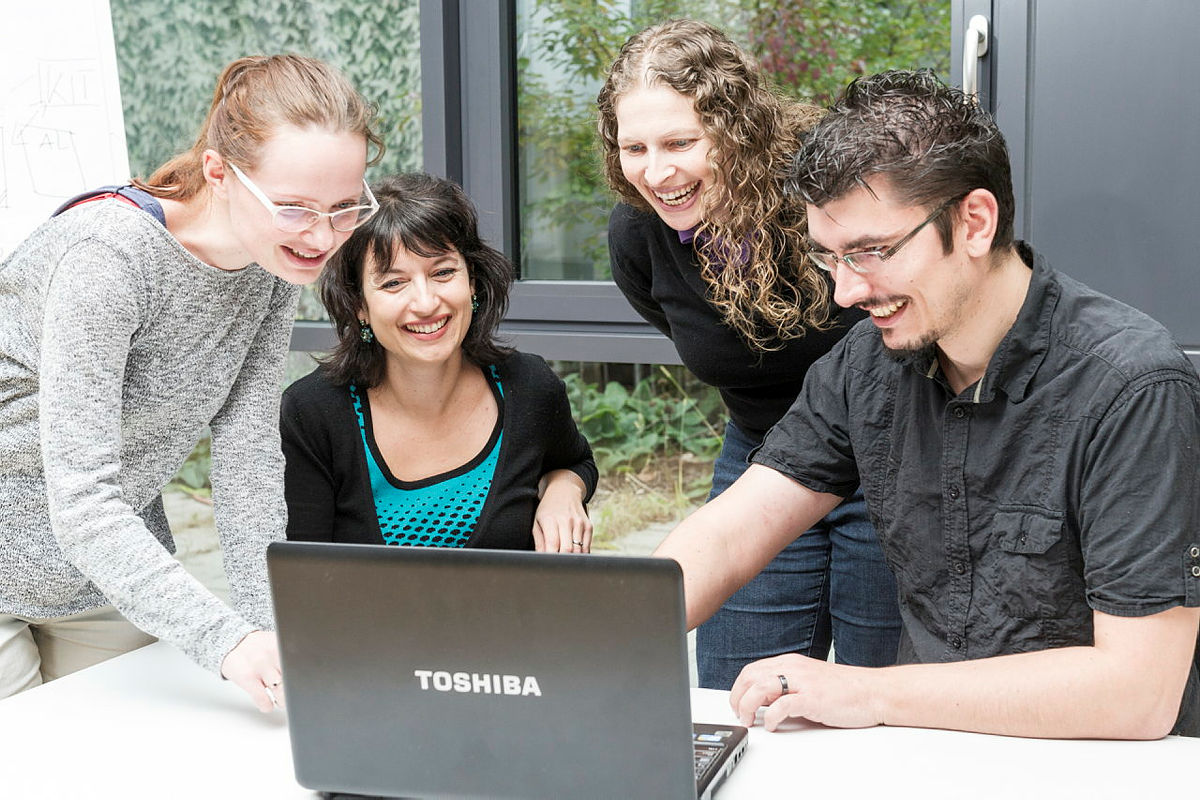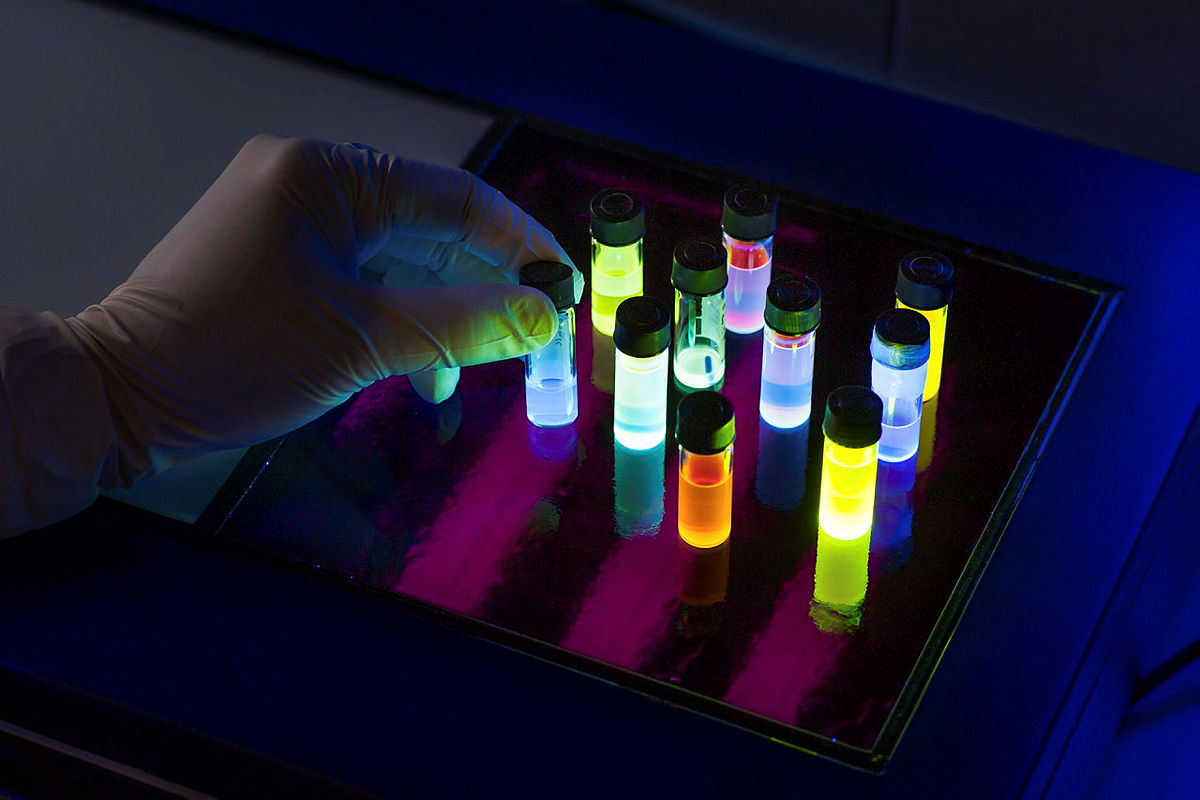
Chemistry course of study
An exemplary course of study can be found for each of the three variants in the module manual.
Study variants and F-modules
In the Chemistry/Master's degree program, you can choose between three study variants.
Study variant A: inorganic-organic oriented
Study variant B: physical-mathematical oriented
Study variant C: technical-application oriented
In the 1st semester of your Master's program, you must informally indicate in writing (e.g. by e-mail) to the chairperson of the examination board (for the Master's program) which study variant you choose.
The choice of F-modules taken in the Chemistry/Master's program is subject to approval.
In order to reduce the workload for the examination board, you do not need to obtain explicit approval,
a) if you have chosen the same study variant in the Bachelor's and Master's program, and
b) if you choose the F-modules mentioned in the study plans for the Bachelor's and Master's program; i.e.
- Study variant A: AC-, OC- and PC-F-module and elective module according to the study and examination regulations
 , § 3a (3),
, § 3a (3), - Study variant B: AC-, OC- and PC-F-module and PC-module (focus: physics or TC),
- Study variant C: AC, OC and PC-F module and AWC module.
If a) and b) apply, you can assume implicit approval. However, please note: If you study without explicit approval and take a combination of F and elective modules that cannot be approved, this will only become apparent when you register for your Bachelor's thesis and - since modules have to be made up in this case - will lead to a considerable delay in the course of your studies.
You must obtain explicit permission in any case,
A) if a) or b) do not apply or
B) if you have not completed your bachelor's degree in chemistry at KIT or
C) if you are in doubt whether implicit permission can be accepted in your case.
Please refer to the Leaflet for the study variant B. ![]()
Advanced modules
In-depth modules include an in-depth practical course, which includes a written final report that complies with scientific practice. In particular, this report should contain an introduction to the topic, describe the work carried out in all details (e.g. experimental procedures, detailed series of measurements, spectroscopic data) and include an evaluation of the results obtained. A report on the advanced practical course is to be given in a lecture. In this presentation or, if applicable, in a separate presentation, a general topic is also to be presented, which is to be determined after consultation with the supervisor. This does not necessarily have to be closely related to the topic of the in-depth internship, but it can be.
In addition, two in-depth lectures (2 SWS each) must be heard in the in-depth module. The module handbook and the course catalog provide information about the in-depth lectures offered.
In the final module examination of the in-depth module, which lasts approx. 30 minutes, the contents of the in-depth practical course, the two in-depth lectures and the seminar lecture are examined.
The registration for the in-depth module or the final module examination is regulated by the offering institute.

Application form for students of chemistry and chemical biology for the recognition of study and examination achievements
linkRecognition of study and examination achievements
Please refer to the respective regulations of the examination regulations for the recognition of study and examination achievements(see B.Sc., see M.Sc, see B.Ed., see M. Ed.). Study and examination achievements as well as periods of study completed in courses of study at state or state-recognized universities and universities of cooperative education in the Federal Republic of Germany or at foreign state or state-recognized universities can be recognized upon application by the student, provided that with regard to the competencies acquired there is no significant difference to the achievements or degrees which are to be replaced. No schematic comparison is to be made, but rather an overall consideration. Students must submit the documents required for recognition and submit the application with the documents required for recognition within one semester of enrollment.
Knowledge and skills acquired outside the university system shall be credited if they are equivalent in content and level to the study and examination achievements that are to be replaced and the institution in which the knowledge and skills were acquired has a standardized quality assurance system. Credit may be denied in parts if more than 50 percent of the university studies are to be replaced.
The examination board is responsible for recognition and crediting; as a rule, it decides on the basis of a recommendation by the relevant subject representatives.
Students of biology and food chemistry can find information about the recognition procedure on the corresponding pages of the study programs. For students of Chemistry and Chemical Biology there is a joint recognition procedure, which is described on the application form .
Master achievements in advance
In order to ensure a smooth transition without loss of time between the chemistry bachelor's and master's degree programs, master's credits can already be completed with immediate effect, even if one is formally still in the bachelor's degree program. The following rules apply:
Possible master's degree credits:
- Advanced module (the "missing" F-module that has not yet been taken in the Stg. BA).
- Elective module
Achievements that may only be taken once one is actually enrolled in the Master's program:
- Key qualifications
- specialization module
- Master thesis
The following restrictions apply:
- ALL basic modules must be completed in full and 120 LP must have been achieved (grade extract).
- Only the respective course work (internship, lecture exams) may be taken as master's course work, but not the module final exams (MAP).
- Students must clearly declare that they wish to take the corresponding F modules as master's modules, since the BA or MA F modules differ in scope.
- Entry requirements for the respective modules remain unaffected, e.g. entry exam PC.
Choice of subjects Bachelor's thesis, specialization subject, Master's thesis
In the chemistry program, a bachelor's thesis, an in-depth internship and a master's thesis must be completed in the working groups.
Understand the additional offer resulting from the bachelor thesis (which did not exist in the diploma program) as a chance to broaden their spectrum of knowledge. For the broadest possible education, it does not seem sensible to carry out or prepare the above-mentioned internships and theses in one and the same working group. Even the execution in different working groups of the same institute can be disadvantageous in this sense, if similar topics are worked on in both working groups.
There is explicitly no compulsory or even implicit or perceived obligation to conduct Bachelor's or Advanced Thesis in the same working group as the Master's Thesis.
Therefore, our advice to the students is to do these examination performances in at least two different working groups - even better in different institutes. Ultimately, however, you are free to decide where to take these examinations.
Use your possibilities! Broaden your horizon!
Key qualifications in the course of study Chemistry/M.Sc
Those who have already taken the courses "Legal Studies" and "Toxicology" in the bachelor must provide alternative courses in the amount of 4 LP.
New: A precondition for the admission of a course as SQ is the registration of the performance in the campus management system by the provider, so that the performance appears on the study schedule as "unassigned performance record". This ensures that this performance is entered correctly and is also archived in an examination event. In the future, manual entry will only be possible in justified exceptional cases!
If the courses you are considering are not included in the positive list below, you must submit an informal application to the Examination Committee via Dr. Gbureck.
- Courses that are part of the elective or compulsory program of the chemistry studies (Bachelor and Master) and sports courses are not approved. Please refrain from submitting an application here. In particular, mathematics and physics courses that belong to the compulsory or elective program in study variant B and all courses that can be selected as in-depth lectures (also in the elective subjects Biochemistry, Radiochemistry, Applied Chemistry and Theoretical Chemistry) are also not eligible for approval.
- Suitable courses may include: courses offered by the HoC and lectures from other faculties that usefully complement the skills of chemists (natural sciences, economics, computer science, mathematics). Here, an informal application to the examination board via Dr. Gbureck is required.
Positive List: All courses on this list can be taken as key qualifications and do not require approval:
- all language courses of the Language Center
- all programming courses (the programming course "Numerical Methods in Chemistry" is not eligible)
- all SQ courses of the House of Competence (HoC)
- Safety Chemistry (Prof. Goertz)
- History of Chemistry (Prof. Mönnich)


Here you can find the registration form for theses, which has to be filled out before starting the thesis.
linkMaster thesis
Regardless of the chosen study variant and the specialization subject, the master's thesis can be carried out in any chemical institute as soon as all modules have been completed.
Register with the examination office in the chemistry/master's degree program before starting the master's thesis. For this purpose there is a common registration form for theses of the programs Chemistry (B.Sc., B.Ed., M.Sc.) and Chemical Biology (B.Sc. M.Sc.), which you have to fill in beforehand. Please also bring a current transcript of grades (90 credit points).
Additional achievements
Please note: the recording of additional achievements according to §15 SPO is only possible if these are recorded in the campus management system by the provider , so that the achievement appears on the study schedule as "unassigned achievement". This ensures that this performance is entered correctly and is also archived in an examination event. You may request that the credit be assigned in Dr. Gbureck's office hours.
For better utilization of internship capacity and for safety reasons, registration for the F internships in AC, OC and PC takes place on a common platform; please register here
Link
